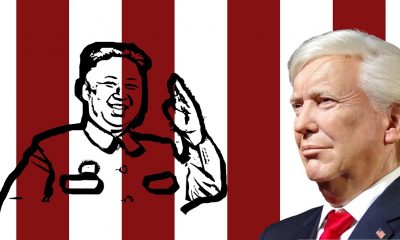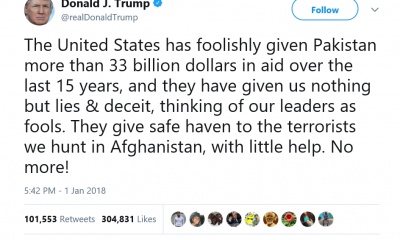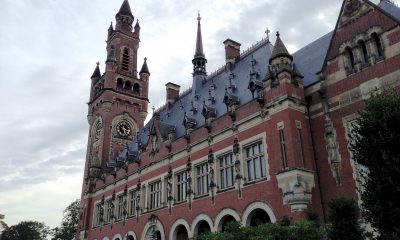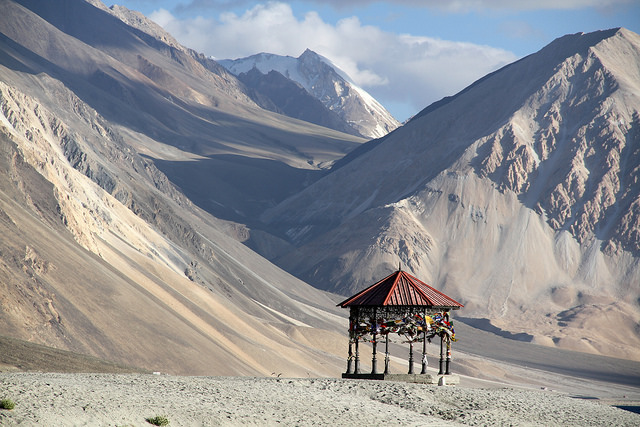Opinion
Overview of Russia’s Recent Foreign Policy, India Important for Both US and Russia: Gabriela Ionita
As soon as Vladimir Putin assumed power in Kremlin last year, we have seen immense involvement of Russia in the international affairs. From Cyprus to Iran and Syria, the amount of aggressiveness Russia showed to maintain its interests was comparable to Soviet times. After a big gap of 20 years, when this huge nation was keeping a low profile since the collapse of Soviet Union, Russia’s recent active role in the world politics has given hopes that soon we are going to see a multipolar world ending US dominance. To discuss the mood in the Kremlin we interviewed Gabriela Ionita, Editor in chief of Power&Politics World who is also an expert in Russia’s international affairs.
TWR: After the collapse of Soviet Union, we saw Russia had gone under a cold state. There was almost negligible response from Russia on Iraq and Afghanistan war. But we could see some response from Russia on Libya, and now Russia has come out fully aggressively in Syria’s case. Do you think all these years, when Russia re-established itself on the global platform, it has prepared itself to take on western world again on global geopolitics issues? Are we going to see a bipolar or a multi polar world soon?
G.I.: We are already part of a world with multiple power centers. President Obama’s speech, at the recent meeting of the UN, certifies such a perception of political analysts. To reduce the geopolitical equation only highly questionable relationship between U.S. and Russia is meaningless. There are numerous emerging economies from which even Russia and U.S. could learn some useful lessons. Also, there are many cooperation organizations to which the two are not only States, but also leaders and the need to find consensus solutions to highlight leadership. And last but not least, we see that today almost all the countries of the world – from the European Union, the Middle Orient, the Chinese and American societies – are faced, in one form or another, with the need to find new strategies and preserve their identity in the radically changing world, and Russia – a huge melting pot of ethnicities and cultures – cannot make an exception from it.
In the last two decades, Russia has changed its political and ideological concepts as far as was possible with the legacy of the former USSR, legacy assumed open by the new leaders in Moscow. As you were saying, there was almost a negligible response from Russia on Iraq and Afghanistan war. But we must remember that Russia had its own catastrophic experience in Afghanistan, whose consequences are still felt in the minds of the Russian society. So it’s good to notice that after the disintegration of the USSR Russia has really felt what a collapsed state means. Its first and foremost priority was the domestic situation. It is known that the economic growth, prosperity and geopolitical influence are derivatives from the total condition of a settled society. After overcoming the urgent impediments of internal order, it was logical for Russia to wonder itself: ”who is ?” and where should it be looking on foreign policy for supporting its own interests. The first step, of course, was trying to gain the regional influence and, subsequent, the global influence and its returning to the table of the world’s great leaders.
Regarding the reaction to the conflict in Libya, I do not think that Russia had a clear strategy. This was more an attempt of the ex-president – the current prime minister Medvedev – to improve his personal political rating, which proved to be a rather unsuccessful attempt. Instead, Russia’s intention to protect its interests in the Middle East were seen in the intervention in Syria. Russia wants to be a major decider and even a major opponent when its interest dictates. And if you take a peek at the commercial agreements between Russia and Syria or Iran, it is easy to see that here the interests dictate.
Contrary to controversial statements regarding Russia’s imperial obsessions, restoring the USSR and other such foolishness that the russophobias propaganda sites are full of, there is nothing unusual in Russia’s intentions. Looking closely and judging right, we can see that all the great and small powers of the world are doing everything they can to promote their economic interests and preserve their own sphere of influence. What differs are only the methods and strategies used. Some prefer to invoke the principles of democracy and human rights, other – the rule of law and veiled threats, other – economic pressures and direct threats, others – just shut up and do – the last statistically having the best results.
TWR: – But what do you think about the relations between Russia and the U.S. at the moment?
G.I.: On one hand, it would be childish of us to believe that between two states that claim to be a global power pole there could be a relationship like ”milk with honey”. On the other hand, in spite of the officials declarations, the restart of Russian and American relations continued all along (sometimes even for reasons of internal propaganda of the two states) to be hunted by the ghosts of the Cold War. Nowadays, at the level of perception of public opinion I will quote Olga Kamenciuk, communications director of the Russian Center for the Study of Public Opinion. “Lately, between Russia and the U.S. there are many differences. Mainly, this is on the cases such as Snowden and about Syria. Regarding Snowden, for example, most Russians thought that Russia’s position will worsen relations with the U.S., but only 15% are saying he does not have to be granted political asylum”. The same is the public opinion in the case of Syria. Russians understand that this situation will worsen relations with America, but prefer an independent position of their country on this issue. In the U.S., the situation is somewhat similar. According to Gallup (agency for marketing and social studies) for the first time since 2000, the number of those who consider Russia an enemy exceeded the number of those who see Russia as an ally.
But it’s good to remember that not always the public perception also means the reality behind the closed doors. U.S. and Russia worked together and effectively collaborate on the levels where the interests of the two coincide. The fight against terrorism, drug trafficking, aviation security, cybercrime are some aspects of this collaboration. Then, behold, recently a NATO ship arrived in port at St. Petersburg as part of continued NATO-Russia Council military cooperation, and provided an opportunity for naval counterparts to meet and exchange experiences. And even when we are tempted to believe that relations between the U.S. and Russia are at their lowest level in a few days will take place in Brussels the first over two years meeting of the NATO-Russia Council (NRC) at the level of Defense Ministers with the participation of Russian Defense Minister Sergey Shoigu. The NATO headquarters considers Shoigu’s involvement in the meeting the unique opportunity to give an impetus to military relations between Russia and NATO in the field of security. So here, the reality is much more complex and cannot be reduced to categorical labels.
TWR: In spring, Cyprus approached Russia under financial crisis to seek potential bailout plan which Russia refused. Why do you think that Russia let go such a big opportunity of earning a partner in Mediterranean Sea, who was ready to offer its gas fields and warm water port at a strategically important place just under the nose of EU?
G.I.: In reality, things are not so simple. Many people said they were surprised and wondered at the time why the Prime Minister Medvedev stepped out in the case the Cyprus crisis. There are two main aspects that need mentioning: first – Cyprus is an EU member state. And as a member of the EU, many of the internally decisions required leaders must receive first approval from Brussels. The second aspect – the EU is Russia’s main trading partner. Neither of the two can to decide unilaterally, without respecting certain commitments previously taken and without assuming certain economic and diplomatic consequences in case of slippage. Russia could not call into question the partnership with the EU to an offer rather unclear and unlikely from Cyprus. Then, I do not exclude that the Kremlin was probably happy that their citizens, holders of accounts with many zeros in banks in Cyprus, to receive a lesson. If Russia’s option was estimated right will see soon, because last week Permanent Representative of the Russian Federation at the EU, Vladimir Chizhov told Itar-Tass in an interview that Russia and the European Union “have practically completed the implementation of joint steps towards a transition to a visa-free regime” and they may announce this at the forthcoming Russia – EU summit this winter.
TWR: There are a lot of talks about Russia’s opposition to the pro-European options of Ukraine and the Republic Moldova. Is Eurasian Union a viable project?
G.I.: Yes. Depends what you mean by this “viable”. For now, though thought to bring economic benefits and to be a counterweight to the EU, Eurasian Union is primarily a political project. Or a political project has a limited lifespan. And it offers too few attractions and opportunities in terms of economic, hence more acute lack of adhesion. Ideology does not solve social problems. No wonder that the Customs Union member states require serious focus on the economy development. If Moscow will know to develop such a strategy, then it is possible that countries that today are turning to the EU to reassess the situation. Let’s be honest: the opportunities offered by the EU are not spectacular (if Ukraine will sign the treaty of association and free trade with the EU, it does not mean that it will begin to flow with milk and honey in the streets of Kiev. But it’s something other than continue discussion with Moscow, the latter always in the position of power). If Moscow will not convince that the Eurasian Union can generate economic and social benefits (its policies on migrants are equally ineffective and discriminatory as those of many of the EU countries), then perhaps there will be a period of time as a political project, without the chance to build something solid. The failure of EU policy starts from the fact that it was a political project without economic and social cohesion, despite the propaganda statements. Will Moscow know to avoid a similar mistake? Honestly, at this time, I have great doubts.
TWR: Seeing India cozying up with the US and Israel, Vladimir Putin decided to visit Pakistan searching for a new ally as Pakistan has its own disagreements with USA. Although the visit was later cancelled, do you think the policy of US enemies as Russia’s friends is correct? In South Asia can Russia afford to lose India for Pakistan, where former funds and jointly works on various projects with Russia and is also largest importer of Russian weapons?
G.I.: I think it’s not a very good strategy if we limit ourselves to think only in black and white colors (enemies of America – friends of Russia). The political and economic substance shows us that the things are much more diverse and counts many shades of gray. Each state actors which you listed has interests that it wants to promote, has goals it wants to see fulfilled, and according to them and the global context can opt for a partnership with Russia or with the West, namely America, European Union, or why not, one of the emerging economies of Latin America or Asia.
Returning to the essence: Pakistan has been a loyal USA partner. But, it seems that loyalty was not its strong point in its partner’s eyes. Pakistan’s extensive oil and gas reserves, largely located in Baluchistan province, as well as its pipeline corridors are considered strategic by the West alliance. According to Professor Michel Chossudovsky, in “The Destabilization of Pakistan”, Washington’s foreign policy course is to actively promote the political fragmentation and balkanization of Pakistan as a nation. He said that balkanization is intended for creating a free Baluchistan (with its huge natural resources and a coastline of 750 kms). The remaining coastline with Pakistan would be 250 kms. The warm waters have always been the great game objective. Whether the political and the military establishments of India are aware or not, India’s role carved out by the US is critically important for Pakistan’s denuclearization. India does comprehend very well that if Pakistan is divided and de-nuked, the power in Asia shifts in favour of… India, course. Since China is a fast rising economic and military power, it is essential that the West develop India as an equal economic and military power to counter China. This balance between India and China cannot be maintained if Pakistan is to remains a regional power.
In the same time, for Russia, India is a important partner, but also the importance of relations with Pakistan is already on the increase, if only given Afghanistan’s involvement in drug trafficking, since the bulk of the drugs end up in Russia and the rest go on to Europe. Following the withdrawal of the majority of NATO troops from Afghanistan in 2014, there will remain approximately 10,000 American servicemen (as of 1 January 2013, there were 66,000 American soldiers and officers in the country). The American contingent staying on in Afghanistan will, just as before, need supplies of food, fuel and other products and these will be delivered to Afghanistan via tried and tested routes – through Pakistan and Russia. This means that the coordination of actions between Moscow and Islamabad is also important from this angle… In general, improving relations between Russia and Pakistan could have a positive influence on the situation both in Afghanistan itself and in Central Asia. In addition, we are rather talking about an integrated approach of Russian foreign policy, a step forward from Central Asia to the Asia-Pacific region (somewhat considered a stronghold of the West), and not about a decrease in the importance of partnership with India. Remember, on the sidelines of the Asia-Pacific Economic Cooperation (APEC) forum’s summit in Bali (Indonesia), Sergey Lavrov had a full agenda of bilateral meetings: with Foreign Minister of China, Wang Yi, Indonesia’s foreign minister Marty Natalegawa, Vietnamese Foreign Minister and Deputy Prime Minister, Pham Binh Minh, Minister for Foreign Affairs of Thailand, Surapong Tovichakchaikul. Not to mention the fact that Vladimir Putin celebrated his birthday as a star.
TWR: Just because you reminded about Vladimir Putin… Noble peace price holder Obama has provoked Iran and Syria creating tensions not only in the region, but also worldwide. Recently Russian advocacy group has nominated Vladimir Putin for effectively handling the Syria issue and using platforms like G-20 summit to win the votes of other countries and avoid US led military intervention in Syria. But the Nobel winner was Organisation for the Prohibition of Chemical Weapons. Do you think Vladimir Putin deserves to lay claim on Noble Peace Prize?
G.I.: I think it’s better to clarify something: according the official website of Nobel Foundation, the nominations to Nobel Prize must usually be submitted to the Committee by the beginning of February in the award year. Nominations postmarked and received after this date are included in the following year’s discussions – aspect applies to Putin’s nomination. Events are dynamic, there’s enough time until next year assessments. But, it is true, no one has explained how – surprising – the OPCW appeared on the list of nominations. However, I think it was a quick compromise decision. One designed to bind up the “wounds” of some prides hard hit on the shores of Neva. Due to its political nature, the Nobel Peace Prize has, for most of its history, been the subject of controversies. By the way, awarding the Nobel Prize to U.S. President Barack Obama has sparked a wave of criticism and ironic statements in many countries. Also, critics took the initiative of Russia Academy. The main argument of opponents: both leaders patronized armed conflicts. They are right, aren’t they?
 |
|
Gabriela Ionita,
Editor in Chief Power&Politics World
|
Gabriela Ionita is Editor in chief of Power&Politics World online journal, analyst in the field of International affairs (mainly connected with the Russian Federation and Community of Independent States). Also maintains a frequently updated her personal blog. She took her university degree in Communication and Public Relation at the National School of Political and Administrative Studies – Bucharest/Romania. Currently attending master studies in the field of Foreign languages and civilizations (Slavonic studies) at the Faculty of Philology from Al.I. Cuza University – Iasi).
China
Nepal Hindu Rashtra: Time to Wrap Up Communism?

Nepal abolished the Constitutional Monarchy in May 2008 and declared itself as a Federal Democratic Republic. There was a new hope in Nepal as it was becoming world’s newest democracy even though it had dissolved the Hindu Rashtra. However, the democracy in Nepal immediately got into the tight grips of leftists and communists backed by China. It has been almost 12 years since monarchy was abolished in Nepal. Interestingly, the Himalayan country has already seen 11 Prime Ministers in this period. Thus, leaving the Nepalese people still yearning for good and stable governance.
Re-establish Hindu Rashtra
As the political instability is growing in Nepal, people are demonstrating concerns about the future of the country. In fact, Nepalese citizens are unhappy with frequent interference by China and India influencing its unstable communist regime. More voices are now growing in support of reinstating the Monarchy and declaring Nepal as world’s only Hindu Rashtra (which by default offers full religious freedom to other religious minorities as per Hindutva concept of Sarva Dharma Sama Bhava – all paths lead to one).
Former Deputy Prime Minister of Nepal, Kamal Thapa said that if political parties do not recognize the seriousness of reinstating the monarchy, then the country will head for a period of darkness. “Recently, we’ve had high-ranking officials from India and China come to Nepal to try and solve problems within the ruling party,” he said. “We cannot let others dictate what we want to do.”
Communist Party All Set to Suppress Protests, By Force
Kamal Thapa has firmly demanded an all party meet to discuss reinstating of monarchy. Throughout the month of December, 2020 Nepal has seen anti communism protests across the country in support of reinstating the monarchy and Hindu Rashtra. Most importantly, the demand has become a nationwide mass people’s movement. So much so that the communist regime had to send a directive to 77 districts in 7 provinces. The directive suggests suppressing the protests by force. Nevertheless, Rashtriya Prajatantra Party and other royalist groups have ignored this threat from the communist regime. Protester groups have pledged to strengthen the protest in the coming weeks.
Nepal: Demonstration held in capital Kathmandu, demanding restoration of monarchy in the country. pic.twitter.com/TFjmKu9U9Z
— ANI (@ANI) December 5, 2020
Role of China – Hope for Communism in Nepal
China’s ambassador to Nepal is known to have very close relationship with Nepalese Communist regime. In fact, She has been super effective in tilting Nepal’s posture towards its ideological partner, China. One of her greatest achievements in 2020 was artificially manufacturing a border conflict between Nepal and India. Consequently, souring relations between the two Hindu majority nations. In addition, she managed to silence Nepal’s communist government after China took one of Nepal’s border villages under its control. However, recent political turmoil in Nepal and a renewed demand for reinstating of Hindu Monarchy is showing that the situation is now out of Chinese hands
Role of India
Year 2020, was not a good year for India and Nepal relations. India was busy in controlling domestic Covid cases. On the other hand, China had launched an invasive campaign into Indian territory. In addition, India is always busy with Pakistan on its western borders. However, the surprise came to India when China was almost successful in creating a new border tension between India and Nepal.
Those who do not know about Indian government should note that the current ruling party in India finds itself ideologically opposite to communism. This further creates differences between the two countries.
Communist party in Nepal has blamed India for supporting the ongoing anti communism protests in Nepal. However, former advisor to Nepal’s PM has suggested there is no proof that India is fueling pro Monarchy, anti communism demand in Nepal.
Nevertheless, There are certain influencers in India who have, in their personal capacity, expressed support for reinstating the Hindu monarchy. Yogi Adityanath, who is the Chief Minister of an Indian state bordering Nepal, said in 2015 that Nepal should declare itself a Hindu Monarchy. Readers should note that in 2015 Yogi Adityanath was not the Chief Minister yet. However, today he is not only popular in south of Nepal, his popularity is growing in Nepal as well.
Will The World See the first Hindu Rashtra?
It is difficult to answer this question at this moment. However, Nepalese communist government could not resolve the political instability and in December 2020 Nepalese government dissolved the parliament. Nepal will see next elections in April – May 2021. Hopefully, the world will see Nepal’s 12th Prime Minister in 13 years or may be a Hindu King? Royalists and protester groups have expressed confidence in winning next elections. We have our eyes on Nepal for updates.
Opinion
America’s Justice System – The Need For Reform
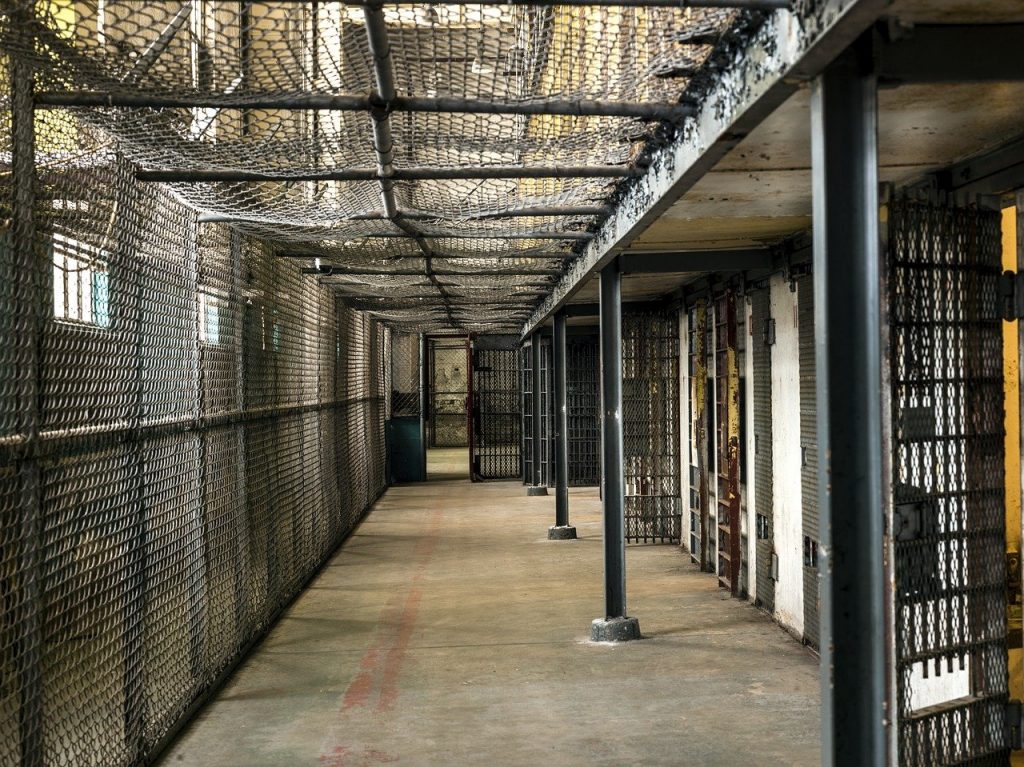
A recent poll by the National Opinion Research Centre revealed that 95% of Americans favour vital criminal justice reforms. This is hardly surprising, given that several people of varying racial, partisan and ideological dispositions have called out the justice system over its many failures throughout the years. Most Americans received the Trump Administration’s First Step Act as a step in the right direction, as about 60% of people approved the criminal justice reform bill according to a 2018 poll. However, many people still believe the justice system’s approach to crime is ineffective and needs dire change, and these are some reasons why.
Prison population and funding concerns
Research conducted revealed America has about 2.3 million prisoners, making the US the country with the highest incarceration rate globally. Experts estimate that the country’s prison population has grown by a whopping 340% over the past three decades; new prisoner admissions into jails are higher than prisoner release numbers. The cost of maintaining the nation’s prisons at taxpayers’ expense has inspired a lot of backlash and calls for budget cuts. According to research, slashed correction spending was the preferred option by most states to balance their budgets and redirect spending to other areas.
Minimum mandatory sentences
Minimum mandatory sentences are statutes that force judges to give defendants convicted of a crime the minimum prison sentence. Mandatory sentences rob judges of the traditional way of considering the defendant’s character and the unique circumstances surrounding offences. Even when represented by criminal defense attorneys with many years’ experience, defendants often succumb to prosecutors’ pressure to plead guilty or face more severe charges with higher mandatory sentences. The guilty plea bargain consequently resolves about 95% of both federal and state court cases. Research also shows that about half of inmates in federal prisons are doing time for drug offences- causing overpopulation in the prison system.
Growing number of people killed by the police
An estimated 1000 civilians are killed by police officers annually in the US. The frequency of police brutality cases over the years requires immediate reform to the American justice system. Data suggests that the incidence of fatal police shootings is higher among African-Americans than any other ethnicity, inspiring movements like the ‘Black Lives Matter’ campaign to press on with protests for significant police etiquette reforms towards coloured minorities. The police force faces incessant accusations of racial profiling, indiscriminate use of power, and poor discretion, which has led a reported 58% of Americans to think policing needs major reforms through measures like better-trained officers, and wearing body cameras.
Evolving public opinion on crime
Research released by the Sentencing Project and The Justice Policy Institute reveals that more people in conservative states are embracing preventive, rehabilitative, and alternative sentencing options for non-violent offenders. Most Americans now view the prevention of crime as the most vital function of the justice system, as 77% of Americans think that focusing more on character education and after-school programs would be cost-effective by reducing the number of people going to jail. Almost two-thirds of Americans also believe in the need for lighter sentences with more useful, reformative programs in prisons that will benefit inmates upon release. Therefore, support for harsh penalties that harden criminals and make them a more significant menace when reintroduced into society has dwindled.
Opinion
The History Question: Is It Better to Remember or to Forget?
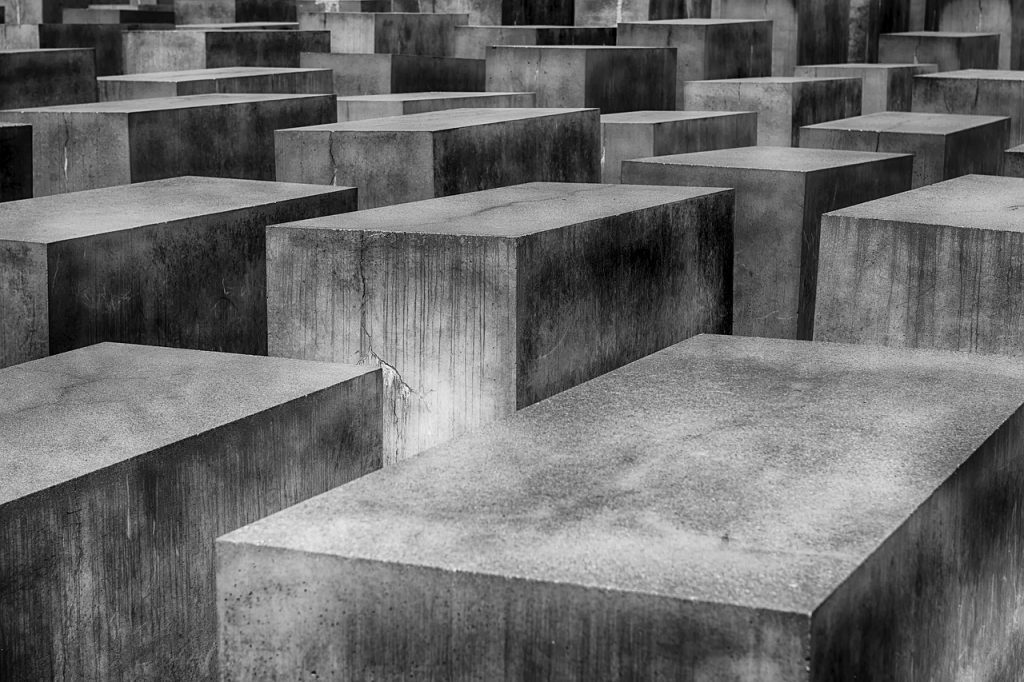
Years ago, a philosopher by the name of George Santayana said a phrase that fuels many debates to this day. His original saying is “those who cannot remember the past are condemned to repeat it”, although, many sources now present it as variations of “those who cannot learn from history are doomed to repeat it”. The latter definitely has more substance to it in the light of the ongoing debate about how much history we should be learning and how.
Is It Better to Remember or Forget About the Past?
On one hand, Santayana was right. Learning about the past is essential in order for people to progress. One also shouldn’t overlook the importance of remembrance and paying respects to the dead, both those who pushed the progress forward and those who have fallen victims to major tragedies that could and should have been averted.
The main argument in favor of learning about the past is that its knowledge is necessary for preventing the same thing happening in the future. Having it one can see the signs and stop the tragedy before it gains momentum.
That’s sound in theory, but the reality is always different. For example, today people are surely forgetting, and the much-critiqued education system is only partially at fault here. Even the greatest of tragedies weren’t spared this fate. It’s a proven fact that about two-thirds of millennials today don’t know about the Holocaust, and this number is surely greater for generations that follow them. In the school history course, the subject of one of the greatest disasters in history is barely touched, if touched at all. And outside of a history classroom, one can only see small, but terrifying, glimpses of it at the Holocaust Museum and other museums that rarely attract many visitors. And now we are witnessing a rise of antisemitic crime.
Are these two facts related? Does the lack of awareness about the horrors done in the name of Aryan supremacy contribute to the fact that right-winged extremists seem to be gaining popularity again?
It does, but by how much? That is the question that no one can truly answer.
And what about other genocides? The Holocaust had the highest death toll, but it was far from the only genocide in history. And quite a few of those happened after World War 2 and before the memory of the atrocities against the Jews began to fade. This means that while forgetting history is a factor, it’s not the deciding factor in its repeats.
But what is that thing responsible for the reenactment of past mistakes and tragedies?
Learning. This is the important thing that is most often overlooked when citing Santayana’s famous saying. It’s not enough to learn about the past and know the facts of things that happened. It’s important to learn from those facts and put in place protections that will prevent them from happening again. And this is something that humanity, as a whole, has yet to succeed in doing.
Dwelling in the Past Can Be Just As Bad
One also shouldn’t forget that there is such a thing as “too much history”. The Bosnian War and genocide that happened there in the 1990s is a vivid example of how the past can be exploited by political powers. Used as a part of propaganda, which fueled the war, history can become a weapon in the hands of those who want to use it for their own goals.
And this is what humans have been doing since the dawn of time. There is always someone who will use any means necessary to achieve whatever it is they wish. This results in wars and genocides, and hundreds of smaller but no less devastating tragedies.
Therefore, the problem isn’t whether people should be learning history but human nature itself. Perhaps, teaching this can help fix this fundamental flaw and truly stop the worst of the past from repeating.
-

 Business11 months ago
Business11 months agoHow To Future-Proof Your Business With The Right Tools
-

 Travel9 months ago
Travel9 months agoTravelling from San Antonio to Guadalajara
-

 Business12 months ago
Business12 months agoWhat are EDC products, and why should you always have them?
-

 Travel6 months ago
Travel6 months agoTravel wellness tips for a healthier and more enjoyable journey
-

 Europe4 months ago
Europe4 months agoRecent Books by Boaventura de Sousa Santos: Law, Colonialism, and the Future of Europe


